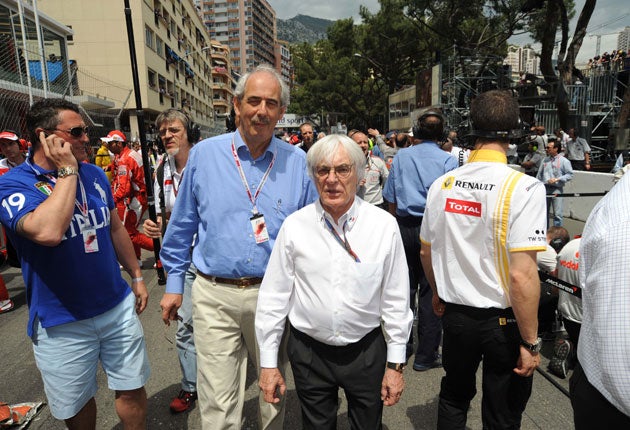Formula One faces rights backlash over Bahrain GP

Your support helps us to tell the story
From reproductive rights to climate change to Big Tech, The Independent is on the ground when the story is developing. Whether it's investigating the financials of Elon Musk's pro-Trump PAC or producing our latest documentary, 'The A Word', which shines a light on the American women fighting for reproductive rights, we know how important it is to parse out the facts from the messaging.
At such a critical moment in US history, we need reporters on the ground. Your donation allows us to keep sending journalists to speak to both sides of the story.
The Independent is trusted by Americans across the entire political spectrum. And unlike many other quality news outlets, we choose not to lock Americans out of our reporting and analysis with paywalls. We believe quality journalism should be available to everyone, paid for by those who can afford it.
Your support makes all the difference.The organisers of Formula One motor racing decided yesterday to reinstate the Grand Prix in Bahrain later this year, despite police battling pro-democracy protesters in the island as the decision was being taken.
The motor racing governing body, the FIA, claimed that the unanimous decision to reschedule the event, postponed earlier this year because of demonstrations, "reflects the spirit of reconciliation in Bahrain".
The FIA does not mention that a quarter of the staff of the Bahrain International Circuit, which hosts the event, have been detained and given graphic details of being beaten and tortured. Some 28 of them have been sacked or suspended and at least five are still in prison. Others have fled Bahrain.
Sheikh Fawaz al-Khalifa, the head of the Information Affairs Authority in Bahrain, announced on his Twitter account that the race would be held on 30 October.
The FIA's decision is likely to involve the sport's governing body in prolonged controversy given the continuing repression of Bahrain's Shia majority. The New York-based Human Rights Watch had previously warned the FIA that the situation in Bahrain had worsened since the race was postponed in February with "large-scale arbitrary arrests, protracted incommunicado detention, and credible allegations of torture."
Contrary to the FIA's claim of to have detected a spirit of reconciliation on the island a heavy police presence failed to halt protests in Shia villages yesterday. But it did stop demonstrators reaching the highways by use of tear gas and rubber bullets.
Police broke up a rally in the village of Sanabis where some 500 people shouted "Down with (King) Hamad" and "Gulf forces out", a reference to the 1,500 Saudi-led troops that entered Bahrain just before martial law was declared on 15 March.
The demonstration began after the funeral of Zainab Ali Altajer, whose family said she died from the effect of a blast bomb. Activists said a man died yesterday from injuries suffered in the March protests, but an interior ministry statement said he died of natural causes.
The official ending of martial law on 1 June has so far had no visible effect on Bahrain's security forces from which Shia are almost entirely excluded. But it is possible that holding the Grand Prix may lead the government to reduce arbitrary arrests and torture. It will also make it harder for it to continue to ban most foreign journalists from entering Bahrain and help to curb police mistreatment of local journalists.
It is clear that not all in the sport were pleased. Mark Webber, the Australian driver who is presently third in the drivers' championship, used his Twitter account to express concern before the decision was taken. "When people in a country are being hurt, the issues are bigger than sport," he said.
Ex-world champion Damon Hill had earlier said that Formula One, "will forever have the blight of association with repressive methods to achieve order" if it returned to Bahrain this year.
For Bahrain, the decision by the FIA to reinstate the race this year is a big public relations coup.
Bahrain International Circuit head Zayed R Alzayani said that the race would attract some 100,000 visitors, and give the island's economy a massive $500m (£304m) fillip.
Join our commenting forum
Join thought-provoking conversations, follow other Independent readers and see their replies
Comments